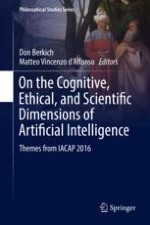2019 | OriginalPaper | Buchkapitel
5. What Arrow’s Information Paradox Says (to Philosophers)
verfasst von : Mario Piazza, Marco Pedicini
Erschienen in: On the Cognitive, Ethical, and Scientific Dimensions of Artificial Intelligence
Aktivieren Sie unsere intelligente Suche, um passende Fachinhalte oder Patente zu finden.
Wählen Sie Textabschnitte aus um mit Künstlicher Intelligenz passenden Patente zu finden. powered by
Markieren Sie Textabschnitte, um KI-gestützt weitere passende Inhalte zu finden. powered by
